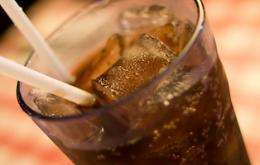Study finds soda consumption increases overall stroke risk

Researchers from Cleveland Clinic's Wellness Institute and Harvard University have found that greater consumption of sugar-sweetened and low-calorie sodas is associated with a higher risk of stroke. Conversely, consumption of caffeinated or decaffeinated coffee was associated with a lower risk.
The study – recently published in the American Journal of Clinical Nutrition – is the first to examine soda's effect on stroke risk. Previous research has linked sugar-sweetened beverage consumption with weight gain, diabetes, high blood pressure, high cholesterol, gout and coronary artery disease.
"Soda remains the largest source of added sugar in the diet," said Adam Bernstein, M.D., Sc.D., study author and Research Director at Cleveland Clinic's Wellness Institute. "What we're beginning to understand is that regular intake of these beverages sets off a chain reaction in the body that can potentially lead to many diseases – including stroke."
The research analyzed soda consumption among 43,371 men who participated in the Health Professionals Follow-Up Study between 1986 and 2008, and 84,085 women who participated in the Nurses' Health Study between 1980 and 2008. During that time, 2,938 strokes were documented in women while 1,416 strokes were documented in men.
In sugar-sweetened sodas, the sugar load may lead to rapid increases in blood glucose and insulin which, over time, may lead to glucose intolerance, insulin resistance, and inflammation. These physiologic changes influence atherosclerosis, plaque stability and thrombosis – all of which are risk factors of ischemic stroke. This risk for stroke appears higher in women than in men.
In comparison, coffee contains chlorogenic acids, lignans and magnesium, all of which act as antioxidants and may reduce stroke risk. When compared with one serving of sugar-sweetened soda, one serving of decaffeinated coffee was associated with a 10 percent lower risk of stroke.
In addition, study findings show that men and women who consumed more than one serving of sugar-sweetened soda per day had higher rates of high blood pressure and high blood cholesterol and lower physical activity rates. Those who drank soda more frequently were also more likely to eat red meat and whole-fat dairy products. Men and women who consumed low-calorie soda had a higher incidence of chronic disease and a higher body mass index (BMI). The investigators controlled for these other factors in their analysis to determine the independent association of soda consumption on stroke risk.
"According to research from the USDA, sugar-sweetened beverage consumption has increased dramatically in the United States over the past three decades, and it's affecting our health," said Dr. Bernstein. "These findings reiterate the importance of encouraging individuals to substitute alternate beverages for soda."















